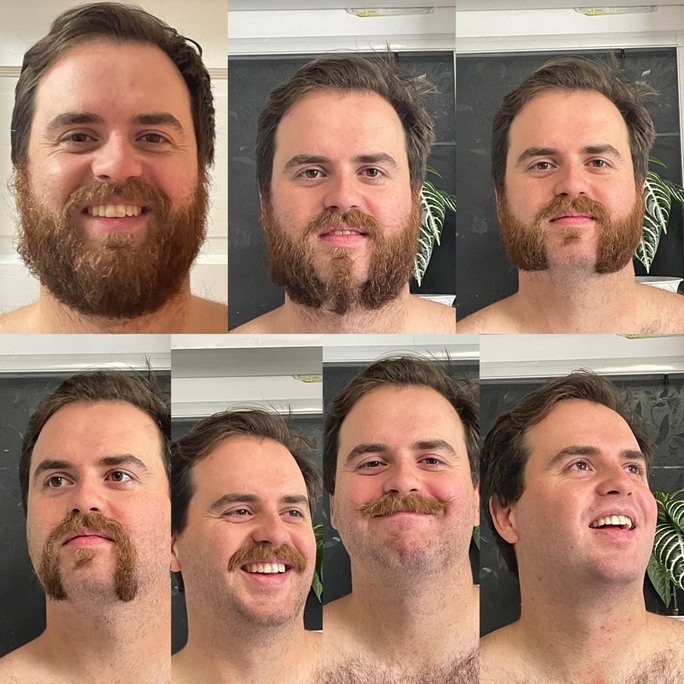Warning: This article discusses issues of mental health and suicide.
While mustaches have come back in style over the last few years, you might notice a few more men sporting a lip sweater in the month of November. Movember started in 2003 with efforts directed at raising funds and awareness towards male specific cancers. In the last few years it’s shifted focus some towards men’s mental health.
In Fort Frances, Justin Anderson and his Movember team have raised nearly $40,000.00. The manager of Betty’s, a Scott St. mainstay, started fundraising with Movember after his brother, Will, lost his life to suicide in 2018.
Anderson says since his brother’s death, he’s taken it on himself to show other men that it’s ok to talk about mental health issues.
“I think it provides an opportunity to let men and young men in particular know it’s ok to talk about their feelings and their mental health in general,” Anderson said. “Also for me it’s a way to maybe share my brother’s story and maybe some people learn from that and realize how many people do care.”
Since he started fundraising, Anderson calculates that he’s raised almost $40,000 and so far this year has raised around $3,000. In aid of his fundraising efforts Anderson is selling ‘Mustache/ suicide prevention hoodies.’
The hoodies feature a mustache on the front and a semicolon on the back. The semicolon has become a symbol of mental health and suicide prevention over the last few years as well. Mental health advocacy organization Project Semicolon says the symbolism behind the semicolon is that “a semicolon is used when an author could have chosen to end their sentence but chose not to. The author is you and the sentence is your life.” The hoodies are available at Betty’s and cost $60, with the profits going to the Movember campaign. There is also a donation box for those wishing to donate in cash.


Other members of Anderson’s Movember team include his uncle Blair Anderson, Jerome Tuesday, Gavin Moorhouse, and Time Metke. You can see their Movember ‘Mospace’ at movember.com/t/in-honour-of-will-anderson?mc=1
Disturbingly, suicide attempts by men are much more likely to result in death, says Pauline Hyatt, Director of Services at the Fort Frances chapter of the Canadian Mental Health Association (CMHA).
“Men are four times more likely to die by suicide than women with the highest number of suicides amongst men between the ages of 40 and 60,” Hyatt said.
The COVID-19 pandemic has done little to help in this area either.
“Movember Canada, has actually done some statistics,” Hyatt said. “Since COVID began, they’ve actually noticed that more than half or 55 per cent of Canadian men are experiencing poor well-being because of the pandemic, and at least half said they believe living through the pandemic may have changed their mental health forever.”
Hyatt says another issue when it comes to men’s mental health is that issues can present in different ways.
“Signs and symptoms of mental health conditions can present themselves differently sometimes in men,” Hyatt said. “Sometimes men are more likely to describe their mental health concerns as physical symptoms such as headaches or chronic pain which is hard for diagnostic tools to pick up. There’s this link between signs of mental health issues and physical symptoms that is often unrecognized and leads to undiagnosed, untreated men.”
Often, Hyatt says, men are reluctant to get help because of the pressure to be family leaders and breadwinners.
“Sometimes, you know, men are expected to be strong and successful, and success is measured through power, position, financial security,” Hyatt said. and as a result self-care and stress management can be seen as signs of weakness when it isn’t.”
Hyatt says that to prevent this attitude from continuing, mental health needs to be taught at a grassroots level.
“What we can do about that is we can be teaching young children to take care of themselves,” Hyatt said. “We can teach healthy coping skills and self-care practices so that they’re better prepared to understand unhealthy thoughts and behaviors when they’re teenagers and adults. But it really starts when they’re young, getting them to understand we’re allowed to talk about this stuff.”
Anderson says he often wonders what he could have done to help his brother. He wonders if mental health might have been more prominent on social media like it is now a few years ago, maybe he would have been able to help his brother.
In Fort Frances the CMHA offers several services that people can avail of for help with their mental health.
“We have a variety of different programs that can help men with their mental health,” Hyatt said. “We have a peer support program, case management program, we now have the new safe bed program and we have counseling for those that are over 60 years of age.”
If you or someone you know is thinking about suicide, call the Canada Suicide Prevention Service at 1-833-456-4566 (24/7).







